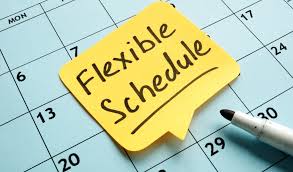The Importance of a Well-Structured Schedule
A well-structured schedule is essential for maintaining productivity, managing time effectively, and reducing stress. Whether you are a student, a professional, or a stay-at-home parent, having a schedule can help you stay organized and focused on your tasks and goals.
Here are some key reasons why having a schedule is crucial:
Time Management
A schedule helps you allocate time for each task or activity, ensuring that you make the most of your day. By planning ahead and setting specific time slots for different activities, you can prioritize important tasks and avoid procrastination.
Increased Productivity
When you have a clear schedule outlining what needs to be done and when, you are more likely to stay focused and productive throughout the day. Setting deadlines for tasks can also motivate you to work efficiently and complete projects on time.
Reduced Stress
Knowing what lies ahead in your day can help reduce feelings of overwhelm and anxiety. A well-structured schedule allows you to break down your workload into manageable chunks, making it easier to tackle one task at a time without feeling overwhelmed by the big picture.
Improved Work-Life Balance
By creating a balanced schedule that includes time for work, relaxation, exercise, social activities, and personal hobbies, you can achieve better work-life balance. Prioritizing self-care and leisure activities in your schedule can help prevent burnout and improve overall well-being.
Goal Achievement
A schedule serves as a roadmap that guides you toward your goals. By breaking down larger goals into smaller actionable steps and scheduling them into your daily or weekly routine, you can make steady progress toward achieving your objectives.
In conclusion, implementing a well-structured schedule in your daily life can lead to increased productivity, effective time management, reduced stress levels, improved work-life balance, and greater success in achieving your goals. Take the time to create a personalized schedule that works best for you and reap the benefits of better organization and efficiency.
7 Essential Tips for Effective Schedule Management
- Create a daily to-do list to prioritize tasks
- Set specific goals and deadlines for each task
- Schedule breaks to rest and recharge throughout the day
- Use a calendar or planner to organize your schedule
- Avoid multitasking to stay focused on one task at a time
- Learn to say ‘no’ to avoid overloading your schedule
- Review and adjust your schedule regularly for better efficiency
Create a daily to-do list to prioritize tasks
Creating a daily to-do list is a valuable strategy for prioritizing tasks and enhancing productivity. By outlining the tasks that need to be accomplished each day, individuals can focus on what is most important and allocate their time and energy efficiently. A to-do list helps in organizing thoughts, setting clear goals, and maintaining a sense of direction throughout the day. Prioritizing tasks on the list allows individuals to tackle the most critical or time-sensitive activities first, ensuring that essential responsibilities are addressed promptly. Overall, incorporating a daily to-do list into one’s routine can lead to improved time management, increased focus, and a greater sense of accomplishment as tasks are completed systematically.
Set specific goals and deadlines for each task
Setting specific goals and deadlines for each task is a powerful strategy to enhance productivity and time management. By clearly defining what needs to be accomplished and assigning a deadline to it, individuals create a sense of urgency and focus that drives them to work efficiently towards their objectives. This approach not only helps in prioritizing tasks but also provides a clear roadmap for progress, ensuring that important milestones are met in a timely manner. Breaking down larger projects into smaller, manageable goals with deadlines can make daunting tasks more achievable and boost motivation as progress is made towards completing each task.
Schedule breaks to rest and recharge throughout the day
Scheduling breaks throughout the day is a crucial tip for maintaining productivity and overall well-being. Taking short breaks allows you to rest, recharge, and refocus your energy, making you more efficient when you return to your tasks. It also helps prevent burnout, improves concentration, and enhances creativity. By incorporating regular breaks into your schedule, you can strike a balance between work and relaxation, ultimately leading to better performance and a healthier mindset.
Use a calendar or planner to organize your schedule
Using a calendar or planner to organize your schedule is a highly effective strategy for staying on top of your tasks and commitments. By visually laying out your appointments, deadlines, and daily activities, you can better manage your time and prioritize important tasks. A calendar or planner allows you to see your schedule at a glance, making it easier to avoid double-booking yourself and ensuring that you allocate sufficient time for each task. Additionally, the act of physically writing down your schedule can help reinforce memory and increase accountability, ultimately leading to improved productivity and time management skills.
Avoid multitasking to stay focused on one task at a time
To maintain focus and productivity, it is advisable to avoid multitasking and instead concentrate on one task at a time. By dedicating your full attention to a single task, you can work more efficiently, produce higher-quality results, and minimize errors. Multitasking can lead to divided focus, increased stress levels, and reduced overall effectiveness. Prioritizing tasks and completing them sequentially allows for better concentration, improved time management, and a sense of accomplishment upon task completion. By focusing on one task at a time, you can enhance your productivity and achieve better outcomes in your work or daily activities.
Learn to say ‘no’ to avoid overloading your schedule
Learning to say “no” is a valuable skill when it comes to managing your schedule effectively. By setting boundaries and declining tasks or commitments that do not align with your priorities or goals, you can prevent overloading your schedule and feeling overwhelmed. Saying “no” allows you to focus on what truly matters to you, allocate your time and energy efficiently, and maintain a healthy work-life balance. Prioritizing your well-being and honoring your limitations by declining unnecessary obligations can lead to a more balanced and fulfilling lifestyle.
Review and adjust your schedule regularly for better efficiency
Regularly reviewing and adjusting your schedule is a valuable tip for improving efficiency and productivity. By taking the time to reassess your tasks, priorities, and time allocations on a regular basis, you can identify areas for improvement, eliminate unnecessary activities, and make necessary adjustments to optimize your workflow. This proactive approach allows you to stay flexible and responsive to changing circumstances, ensuring that your schedule remains aligned with your goals and objectives. Embracing a mindset of continuous improvement through regular schedule reviews can help you maximize your time, energy, and resources more effectively.


